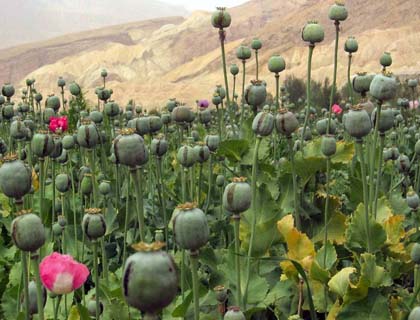Opium fire from Afghanistan is burning Afghanistan itself, countries in and beyond the region. Afghanistan has turned into an opium producing factory that involves thousands of people and is making booming profit each year. From a simple drug hawker to war lords, tribal leaders and high ranking government authorities, all are having growing business. The consumers of drugs from Afghanistan are present now in more countries than it was previously assumed. The chain of drug traffickers makes sure that drugs are supplied to the drug addicts on a regular basis. The lingering war, lowest level of security, political instability, lack of law and good governance make a feasible environment for the drug traffickers to do their business.
Over 90 percent of the world's total drug comes from Afghanistan. For the famers, cultivation of poppy is a hen that gives golden eggs. Therefore, farmers desiring to get rich within nights and with little effort, have focused their attention on growing more poppy in their fields and have turned a deaf ear to what government's requests from them, "Stop cultivating poppy, it is Haram (not Halal, taboo) in Islam."
The campaign of government of Afghanistan to encourage Afghan farmers to cultivate alternative crops has badly failed. Although there are claims and reports that poppy cultivation has decreased in Afghanistan, the flourishing drug trade and increasing number of drug addicts proves all claims and reports as baseless and erroneous.
Today in Afghanistan, more than one million Afghans are addicted to drugs. This number is multiplying at a very fast pace putting the future of Afghan youths at great stake. Unfortunately, drug addicts also include women and children; which is quite odd for Afghanistan. Drugs are openly sold in Kabul and other provinces of Afghanistan and drug addicts roam freely everywhere creating social problems for the people. If the efforts are not in place to improve this condition, how could one believe the government is undertaking country-wide operations to tackle the opium?
The failures to control the opium production and trafficking seriously question the effectiveness of the billions of dollars of international aid so far spent, especially the portion spent to control the Afghan drug. The government of Afghanistan is already under continuous pressure because of not doing enough to curb corruption. The growing number of drug addicts in the country and further spread of drug trade are adding fuel to the fire.
The drugs from Afghanistan are not confined to the borders of Afghanistan or countries in the region but being trafficked to European and African countries through our neighbors. Behind the wide spread poppy trade, inadequate control over the borders is a prominent factor. The UN reported in 2009 that approximately 40 per cent of Afghanistan's heroin is trafficked each year into Pakistan, about 30 per cent enters the Islamic Republic of Iran, and 25 per cent flows into Central Asia.
"The Afghanistan/Pakistan border region has turned into the world's largest free trade zone in anything and everything that is illicit — drugs of course, but also weapons, bomb-making equipment, chemical precursors, drug money, even people and migrants," according to UN Office of Drug and Crimes (UNODC).
Since 2009, much has changed in regards of drug trafficking for our neighboring countries, especially the Central Asian states. Central Asian states are a critical conduit for the transportation of Afghan opium and heroin, according to a UNODC report released in July, 2011. The 2011 report estimates that 90 tons of Afghan heroin was trafficked through the Central Asian region, with 75-80 tons heading towards Russia and 11 tons consumed by drug users in Central Asia.
Tajikistan and Kyrgyzstan are the two Central Asian states most vulnerable to drug traffickers looking to move the contraband from Afghanistan to Russia and China, the UNODC's "The Global Afghan Opium Trade: A Threat Assessment" report said.
Drug trafficking in Tajikistan has also spiked due to the growing instability in northern Afghanistan, which has forced law enforcement in both countries to focus their activities on counter-insurgency issues. This has made it easier for drug traffickers to seep across Tajikistan's already poorly protected border. Kyrgyzstan is also seeing an uptick in drug trafficking because of recent security issues in the country. According to the report, 85,000 Kazakhs are now addicted to heroin or opium and consumed 18 tons of the drug in 2009.
Russia has been a prominent country which has repeatedly complained about Afghan opium and has criticized NATO for not doing enough to cut off the wide poppy cultivation and prevent the drug trafficking network from further expansion. According to Russian government, yearly around 30,000 people in Russian and more than 100,000 people around the world die of drug consumption.
Russian government has shown willingness to assist the Afghan government in its anti-narcotic efforts. Last year in November, American and Russian drug control agents destroyed heroin laboratories in Afghanistan. But the involvement of Russians in the operations was strongly criticized by President Hamid Karzai deeming it a violation of Afghanistan's sovereignty.
Unfortunately, a significant portion of the funds from drug trade goes into the pocket of insurgents. The Taliban have been fighting the super power along with its allies since the last ten years and they are quite successful. It means that they have proper and constant sources from which they fund their activities. They are quite expert in the drug trade as they did the same in their tenure of government. The formula 'cut the drug if you want to defeat insurgents' will with no doubt work but unfortunately no one seems to have the willingness to apply it.
The Afghan drug is going untreated. The problem will become manifold as the international community is planning to withdraw until 2014. The flames of opium fire burning Afghanistan are catching other countries. It's somehow more dangerous than terrorism. Unfortunately, no serious measures to counter the Afghan drugs are in place.

